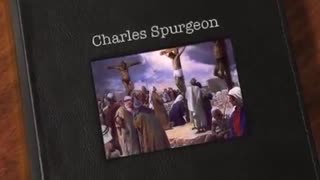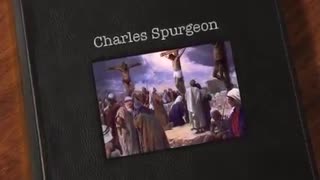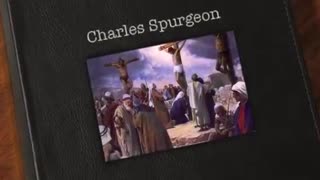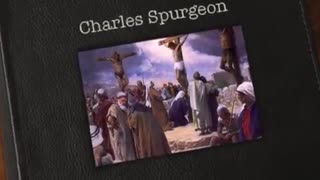Premium Only Content

Morning and Evening October 30th Song of Solomon 8:13 Psalm 9:1
Morning
"I will praise thee, O Lord."
Psalm 9:1
Praise should always follow answered prayer; as the mist of earth's gratitude rises when the sun of heaven's love warms the ground. Hath the Lord been gracious to thee, and inclined his ear to the voice of thy supplication? Then praise him as long as thou livest. Let the ripe fruit drop upon the fertile soil from which it drew its life. Deny not a song to him who hath answered thy prayer and given thee the desire of thy heart. To be silent over God's mercies is to incur the guilt of ingratitude; it is to act as basely as the nine lepers, who after they had been cured of their leprosy, returned not to give thanks unto the healing Lord. To forget to praise God is to refuse to benefit ourselves; for praise, like prayer, is one great means of promoting the growth of the spiritual life. It helps to remove our burdens, to excite our hope, to increase our faith. It is a healthful and invigorating exercise which quickens the pulse of the believer, and nerves him for fresh enterprises in his Master's service. To bless God for mercies received is also the way to benefit our fellow-men; "the humble shall hear thereof and be glad." Others who have been in like circumstances shall take comfort if we can say, "Oh! magnify the Lord with me, and let us exalt his name together; this poor man cried, and the Lord heard him." Weak hearts will be strengthened, and drooping saints will be revived as they listen to our "songs of deliverance." Their doubts and fears will be rebuked, as we teach and admonish one another in psalms and hymns and spiritual songs. They too shall "sing in the ways of the Lord," when they hear us magnify his holy name. Praise is the most heavenly of Christian duties. The angels pray not, but they cease not to praise both day and night; and the redeemed, clothed in white robes, with palm-branches in their hands, are never weary of singing the new song, "Worthy is the Lamb."
Evening
"Thou that dwellest in the gardens, the companions hearken to thy voice: cause me to hear it."
Song of Solomon 8:13
My sweet Lord Jesus remembers well the garden of Gethsemane, and although he has left that garden, he now dwells in the garden of his church: there he unbosoms himself to those who keep his blessed company. That voice of love with which he speaks to his beloved is more musical than the harps of heaven. There is a depth of melodious love within it which leaves all human music far behind. Ten of thousands on earth, and millions above, are indulged with its harmonious accents. Some whom I well know, and whom I greatly envy, are at this moment hearkening to the beloved voice. O that I were a partaker of their joys! It is true some of these are poor, others bedridden, and some near the gates of death, but O my Lord, I would cheerfully starve with them, pine with them, or die with them, if I might but hear thy voice. Once I did hear it often, but I have grieved thy Spirit. Return unto me in compassion, and once again say unto me, "I am thy salvation." No other voice can content me; I know thy voice, and cannot be deceived by another, let me hear it, I pray thee. I know not what thou wilt say, neither do I make any condition, O my Beloved, do but let me hear thee speak, and if it be a rebuke I will bless thee for it. Perhaps to cleanse my dull ear may need an operation very grievous to the flesh, but let it cost what it may I turn not from the one consuming desire, cause me to hear thy voice. Bore my ear afresh; pierce my ear with thy harshest notes, only do not permit me to continue deaf to thy calls. Tonight, Lord, grant thine unworthy one his desire, for I am thine, and thou hast bought me with thy blood. Thou hast opened mine eye to see thee, and the sight has saved me. Lord, open thou mine ear. I have read thy heart, now let me hear thy lips.
===
Charles Haddon (C.H.) Spurgeon (19 June 1834 -- 31 January 1892) was a British Particular Baptist preacher who remains highly influential among Christians of different denominations, among whom he is still known as the "Prince of Preachers". He was a strong figure in the Reformed Baptist tradition, defending the Church in agreement with the 1689 London Baptist Confession of Faith understanding, and opposing the liberal and pragmatic theological tendencies in the Church of his day.
Spurgeon was a prolific author of many types of works including sermons, an autobiography, commentaries, books on prayer, devotionals, magazines, poetry, hymns and more.Many sermons were transcribed as he spoke and were translated into many languages during his lifetime. Spurgeon produced powerful sermons of penetrating thought and precise exposition. His oratory skills held throngs of listeners spellbound in the Metropolitan Tabernacle and many Christians have discovered Spurgeon's messages to be among the best in Christian literature.
http://conservativeweasel.blogspot.com/2011/10/daily-devotional-monday-31st-october.html
AUAWN1031111
-
 4:01
4:01
Morning and Evening from Spurgeon
3 years agoMorning and Evening December 26th Matthew 28:20 1 Corinthians 15:45
445 -
 5:03
5:03
Morning and Evening from Spurgeon
3 years ago $0.02 earnedMorning and Evening October 1st Psalm 84:11 Song of Solomon 7:13
220 -
 4:32
4:32
Morning and Evening from Spurgeon
3 years agoMorning and Evening October 28th Song of Solomon 5:11 John 15:19
325 -
 4:13
4:13
Morning and Evening from Spurgeon
3 years agoMorning and Evening October 13th Song of Solomon 8:6 2 Corinthians 7:10
109 -
 4:34
4:34
Morning and Evening from Spurgeon
3 years agoMorning and Evening October 24th John 13:5 Psalm 104:16
80 -
 4:08
4:08
Morning and Evening from Spurgeon
3 years agoMorning and Evening October 18th 1 Samuel 15:22 Psalm 65:11
1153 -
 4:04
4:04
Morning and Evening from Spurgeon
3 years agoMorning and Evening October 16th Psalm 36:9 John 21:12
1511 -
 4:16
4:16
Morning and Evening from Spurgeon
3 years agoMorning and Evening September 3rd Psalm 11:5 Song of Solomon 1:7
181 -
 4:24
4:24
Morning and Evening from Spurgeon
3 years agoMorning and Evening September 30th Ecclesiastes 9:4 Psalm 66:2
163 -
 4:29
4:29
Morning and Evening from Spurgeon
3 years agoMorning and Evening October 25th Ruth 2:3 2 John 2
286